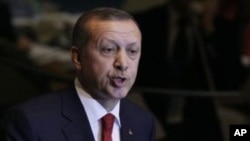Turkish Prime Minister Recep Tayyip Erdogan Thursday blamed the government of Israeli Prime Minister Benjamin Netanyahu for the impasse in Middle East peace talks and called for international pressure on the Jewish state. In U.N. General Assembly speeches, Erdogan and Cyprus President Demitris Christofias clashed over Cypriot plans for gas drilling in the Mediterranean.
The once-cordial Turkish-Israeli relationship has been in a tailspin since Israel’s deadly commando raid last year on a Turkish aid convoy trying to break the blockade of Gaza.
The breakdown was evident in Erdogan’s U.N. General Assembly speech in which he again demanded an Israeli apology for the convoy raid, which killed nine Turkish citizens, and condemned the Netanyahu government for mistreating Palestinians.
The Turkish leader castigated Israel for ignoring scores of U.N. Security Council resolutions on the Palestinian issue and said pressure on Israel is needed to, in his words, “heal this bleeding wound.”
“If we as the international community believe in the ideal of establishing international peace and security as the founding principle of the United Nations, it is necessary to put pressure on Israel to achieve peace despite what those who govern this country do, and show them that they are not above the law," said Erdogan.
Erdogan said in the convoy raid, Israel had “seriously wronged” a country -Turkey - which had shown great friendship to the Jewish state, and reiterated demands on Israel for an apology, compensation to families of those killed, and the lifting of the Gaza blockade.
The Turkish Prime Minister also renewed a warning to Cypriot authorities not to proceed with what he said were “extremely irresponsible” plans to begin drilling for gas in Mediterranean waters.
Turkey is contesting Cypriot offshore claims and says the Greek Cypriot government in Nicosia should not proceed until there is a political settlement with Turkish Cypriots. Erdogan said drilling now would draw an unspecified response from Turkey.
“At this point, we expect all he concerned parties to work actively to insure that the Greek Cypriot administration halts these activities, which can lead to tension not only on the island but also in the entire region," he said. "Otherwise, we will do what is necessary.”
Earlier Thursday, in his U.N. speech, Cypriot President Demitris Christophias said any gas revenues would be shared between the Greek and Turkish Cypriots, even as negotiations for a solution to the Cyprus conflict continue.
He condemned what he said was Turkish navy harassment of gas exploration efforts.
“Unfortunately, the effort of the Republic of Cyprus to exercise its sovereign right for exploitation of its marine wealth is met by threats of Turkey against Cyprus," said Christophias. "Turkish naval maneuvers in the region of Cyprus’s exclusive economic zone, where exploration is being carried out, are provocative and pose a real danger for further complications in the region.”
Christophias said the Nicosia government is “fully committed” to continue working toward a bi-zonal, federal, solution of the Cyprus problem through U.N.-backed inter-communal Greek-Turkish negotiations.
Erdogan Urges Pressure on Israel




